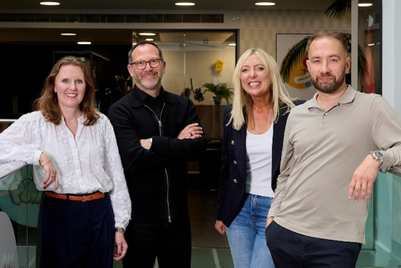
A year ago, global beauty brand Lush walked away from Instagram, Facebook, TikTok and Snapchat, stating that they were "becoming exasperated at the business practice behind these platforms."
In particular, they felt social media platforms were basically the antithesis of everything Lush stands for: wellbeing, self-care, kindness and being good to yourself and others. In all 48 markets where Lush operates, customers were encouraged to ‘Be Somewhere Else’.
And now, one year after its global anti-social media announcement, Lush says they have made the right decision.
"We want to explore new ways of reaching customers, beyond regular social channels and unhealthy algorithms," says Lush’s creative director, Melody Morton. "We know we can capture a new audience by collaborating with brands and franchises, that people love and follow on unique innovative products."
It appears to have paid off. As after leaving the leading social media platforms, the Lush group recorded a pre-tax profit of £29 million ($34.8 million) in its financial year 2022 audited accounts, up from a loss of £45 million ($54 million) the previous year.
Lush are not the only brand to go anti-social media. Back in January 2021, fashion brand Bottega Veneta deleted its social media accounts, and similarly Balenciaga wiped their social media accounts ahead of its first haute couture show in 53 years.
Can brands survive without social media?
Paul Greenwood, head of research and insight for We Are Social, is doubtful that brands turning their back on social media will become a trend.
"Those examples are red-herrings," he says. "For starters, Lush and Bottega Veneta aren’t really off social – they’ve pivoted to a more influencer and ambassador-led approach. These brands still appear across the platforms," adds Greenwood. "I’m going to go out on a limb and say that most marketers, especially when budgets are being tightened, are not going to move away from social just yet."
Olivia Wedderburn, social and influence director at TMW Unlimited, agrees that brands quitting social media aren't actually quitting it.
"A lot of brands claiming that they ‘don’t do social’ have just collapsed their organic presence in the hopes they avoid online customer service and shove out a bunch of paid conversion ads. It’s not particularly revolutionary for a brand to quit social media, just as it’s not subversive for your aunt Kathy to announce she’s quitting Facebook only to be back a week later."
Yet, while quitting social media at the moment might not mean fully quitting social media for brands, at a time when brand safety, privacy, mental health and free speech concerns are rife, it may only be a matter of time.
"I think we will continue to see more brands quitting social media or specific social channels for different reasons," says Emilie Lundberg, head of social at The Works. "From the general impact on people’s mental health to the increased costs and challenges and issues with specific platforms."
Lundberg says that at The Works they are currently seeing a lot of brands making a conscious decision to move advertising spend from Meta to other social channels.
"Larger brands with strong positions can survive without social media and some have never been active on social," adds Lundberg. "They often have strong awareness and word of mouth, or want to remain more exclusive."
Meanwhile, Maya Mausli, strategy director at WhiteGrey believes brands can survive without it.
"There should be questions raised immediately about the brand strategy if the brand can’t survive without it," says Mausli. "The more interesting way to frame the question potentially is what part of the business and brand suffers without social? It all comes back to what the brand was aiming to achieve on social. If it was simply about matching luggage then there are other places that luggage can go."
Low conversion rates and too many competing brands: has social media become a “red ocean” with too much competition?
While social media is certainly more competitive than ever, it seems measurement is by far the biggest concern for brands going into 2023. A report by social listening platform Meltwater found that 56% of APAC marketers find measuring the impact/ROI of social media the biggest social media marketing challenge, with 40% struggling to "prove the value of social media".
"Measurement will be high on the priority list for 2023 as brands need to justify every dollar invested," says Adam Krass, UM Australia’s chief digital, data and technology officer. "There is a shift towards micro-influencers as cost efficient rates and high engagement means stronger ROI. We see an opportunity to drive performance scale and reach."
Lundberg of The Works says that while social media can feel too competitive for brands that do the same as everyone else in their category, it can still offer great opportunities for brands that are willing to innovate and try new ways to cut through and connect with audiences.
"More brands are changing the role social has in their wider marketing plans, says Lundberg. “From purely using it as a cost-effective one-way broadcast channel to deeper engagement, such as 1:1 conversations and interactivity."
And it goes without saying that defining the role social media plays for brands is vital.
"In some ways the assumption that social should act as a sort of cure-all channel rather than knowing how you want to leverage it, is probably what creates the effect of a red ocean," says Mausli.
Mausli adds that at WhiteGrey they talk a lot about tension as they believe it creates extraordinary outcomes.
"We would ask, what is the tension the brand has to solve in the lives of its audience? And then what is the role of social in solving that tension? If our brands are solving real tensions that matter to people, then you’re going to be somewhat popular at the party, even if that party is heaving."
A creator’s market: do brands need their own social media accounts these days, or can they rely on KOLs instead?
As we've seen with brands like Lush, though they might be shutting down their owned channels on social media, they are still working with online spokespeople and designated brand ambassadors to bring their new launches, products and personality to life.
"Absolutely, it can work," says Wedderburn. "It’s one of the many reasons I don’t buy their ‘we’re not on social’ schtick – they’re still creating a narrative around the brand in an online space, but instead of taking Lush’s word for it, you’re taking it from an ambassador whom we are inherently more likely to trust. It’s an incredibly smart model, especially in a social landscape where brand personas, influencers and customer testimonials still rule the roost when it comes to influencing purchase."
But Krass warns that brands need to be aware that if they remove themselves from social media, they are essentially missing out on generations of consumers who rely heavily on online conversations for information.
"KOLs will always have a role to play in terms of brand presence and that goes without saying. But it's not just about ads, it is more than that," says Krass. "It is about creating a brand-consumer relationship that is relatable and authentic. It is about helping customers find products and services that meet their needs. It is also about moderating conversations that foster that connection with the online community."
Shannon O'Neill, digital and social director, Icon Agency, says that while shifting some budget to KOL marketing is a great way to drive awareness that cuts through the noise and resonates with the target audience, it's still best to maintain a social presence.
"If you’re investing in KOL collaboration, it’s always best to have your own presence on social media too," says O'Neill. "This is so that the KOL has somewhere to direct audiences who are looking for more information and it allows the brand to actively engage with the audience who may be commenting on the content."
And O'Neill adds that given social shopping is a trend that is likely to continue to rise in 2023, this social commerce element only adds to the importance of needing a presence on social platforms.
"For brands using KOL marketing to promote products, having an in-platform shop will be a key driver of sales in the coming years and one which makes having a presence on social platforms more than worthwhile."
But others say that while there are many missed opportunities for brands to not have their own social media accounts, it’s definitely possible for some brands to have success without.
"We’re in a creators market at the moment, where people want to hear from people rather than brands, making influencers and ambassadors very effective," says Lundberg. "Especially when it comes to objectives like brand preference. While we’ve sometimes found it less effective for other objectives like brand awareness and first-party data collection compared to when using branded ads from brand pages for example."
Goodbye social media: are there alternative ways to connect with customers that will be equally as effective?
Brands like Lush have been clear that they will no longer be relying on traditional social channels to connect with audiences, but will instead go beyond double taps and likes to seek alternative ways.
So far, it appears Lush has achieved this through partnering with other brands in the form of creative collaborations, as well as creating IRL (in real life experiences), investing in retail – Lush opened its first ever 24 hour automated retail experience in London – and by launching their first app that tracks the physical benefits of bathing. But will this be enough?
"It’s not acceptable to simply shut off social and all comms with your clientele," says Wedderburn. "A huge reason for social becoming so integral to brands in the first place was because it allowed a more flexible, straightforward approach to customer service. If brands revert to the previous model of call-centre only complaints, they would almost certainly be missing out on crucial customer insights."
But Wedderburn can see some logic behind the anti-social movement.
"I think what we’re beginning to see, is some brands turning their back on ‘traditional social’. Shutting down pages, moving from ‘problematic’ deemed channels, and moving into ‘dark’ social spaces," says Wedderburn. "Communication with consumers will exist on private servers, threads, and DMs; whilst big brand proof points will be communicated through influencer, partnerships and paid social. Some may bypass the big four and start exploring more niche channels, such as WeAre8, to return to a more level playing field with other brands."
It remains true that most of the brands that have decided to 'quit' social media to date, have a strong position in the market and potentially more opportunities to find alternative ways to connect with customers.
"While many other brands would struggle to do the same and risk losing more than they would gain, it’s all about the risk and effort vs the reward," says Lundberg. "It can often require more effort, cost, and innovative thinking to find alternative ways than using social media.”
“It also depends on where they effectively can reach their customers,” adds Lundberg. “As we’ve seen more across social media recently, people seek real connections and experiences more than ever before, so brands that can find effective offline alternatives or innovative ways to combine online and offline experiences have a lot to win. I also think we’ll see a big shift in which social platforms brands decide to invest in over time."
(This article first appeared on CampaignAsia.com)


.jpg&h=334&w=500&q=100&v=20250320&c=1)

.jpg&h=334&w=500&q=100&v=20250320&c=1)
.jpg&h=334&w=500&q=100&v=20250320&c=1)

.jpg&h=334&w=500&q=100&v=20250320&c=1)
.jpg&h=334&w=500&q=100&v=20250320&c=1)


.jpg&h=334&w=500&q=100&v=20250320&c=1)



.png&h=268&w=401&q=100&v=20250320&c=1)
.jpg&h=268&w=401&q=100&v=20250320&c=1)
